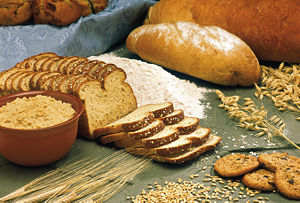
Good morning. In the past few weeks I have spent a good amount of time researching gluten andits effects on people with Celiac disease, gluten sensitivity and the population at large. There is no question those with Celiac should avoid gluten products, as should those with a gluten sensitivity, but what about the rest of us? Should we all avoid this protein composite found in wheat, barley and rye and used to make products doughy, saucy, and bound? On the one hand, gluten is often found in products that are just downright fattening and not in our best interest if trying to lose or maintain weight loss. Food items like pizzas, breads and cakes that rely on gluten for their fabulous textures are obviously not great for our waistline. Many a processed food contains gluten, and we already know that we need to step away from those products for our weight and our health. So yeah, sometimes the foods that have gluten in them are causing weight gain but it’s probably not because of the gluten, more likely the calories. These particular foods also have “addictive” properties, leading to eating too many calories! And personally, if I were gluten sensitive (which I am pretty sure I am not) I would save my money and eat clean foods as opposed to purchasing those gluten free items that mimic our favorite foods but are definitely NOT healthy because they are over processed. (Ok, once in a while everyone needs and deserves to indulge, so I am talking about most of the time…)
Now, on the other side of the coin, gluten may play an important roll in the metabolism of those that are NOT gluten sensitive. Research has shown that an increased intake of gluten lowers triglycerides by as much as 19%. The reason, however, I put the word may in italics is because this particular research was partially funded by the Grain Foods Foundation. I purposely make this point this morning, because we always have to look to exactly who is funding research as well as who is funding the big push for foods and drugs….My best advice? Keep to a diet rich in fresh fruits, veggies, nuts, beans and seeds and you won’t have to worry either way about gluten. And of course you can still eat grains just avoid the 3 mentioned at the beginning of this post. Generally, oats, rice and corn are gluten free but often combine with other grains in multi-item food products, so again, the closer to “whole” the better off. There are also the less popular grains (though growing in that popularity) like quinoa, amaranth, teff, millet and buckwheat.
Before I sign off and begin the work day, once again I must say congrats to my now smoke-free friends and family. So happy for all of you! Keep it up….one day at a time!
Related articles


